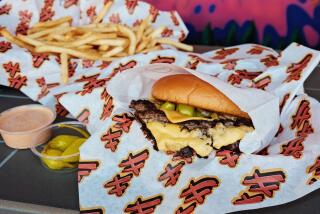Sometimes It’s How You Are, Not Where
- Share via
In a business where experts say location is everything, Choe Byung Ik has managed to attract scores of loyal customers even though his shop on Olympic Boulevard has less than a dozen parking spaces, is barely visible from the street and is short of working and storage space.
Choe, a native of Korea who opened up his Los Angeles dry cleaners in 1980, says he has compensated for his poor location by stressing value and service and making sure his customers are happy.
In eight years of operation, Choe says, and longtime customers agree, he hasn’t once raised prices at his dry cleaners. Shirts are still $1; pants are $1.50 each. After first shipping clothes out to a plant for cleaning and pressing, he has purchased his own equipment, and now cleans and presses clothes in his own facility.
A casual observer might think that the shiny new dry cleaning machine and a row of steam pressers in the back of the shop are the key to Choe’s prosperity.
But Choe says a more important contributor to his financial success sits atop an old wooden table up front: an old sewing machine that Choe’s wife Eun Soo uses to perform alterations, which accounts for about 10% of Choe’s Cleaners’ annual revenue--nearly all of it profit.
“When we first came here we didn’t have machines, (clothes) racks or anything,” Choe, who is assisted by six other employees as well as his wife. “We had only about one or two customers a day. So I taught my wife to sew so we can make more money.”
Today, Choe says, he gets two or three calls a month from business brokers asking him if he wants to sell. Although he estimates his business is worth $250,000 today, Choe, who also owned a dry cleaners in Korea, said he is not interested in selling. In fact, Choe said he would like to expand his 1,200-square-foot shop. But so far negotiations with the landlord have proved unfruitful, Choe said.
The cleaning business is ideal for a fledgling entrepreneur, he said.
“It has flexible hours, and you get holidays and Sundays off,” Choe said. Owners of mini markets or gas stations, Choe said, work twice as hard as owners of dry cleaners.
More to Read
Inside the business of entertainment
The Wide Shot brings you news, analysis and insights on everything from streaming wars to production — and what it all means for the future.
You may occasionally receive promotional content from the Los Angeles Times.










